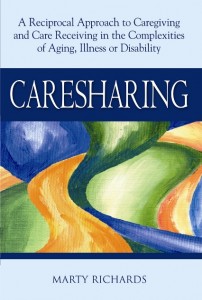 I am sixty something and Mom is in her eighties and living with breast cancer. She has decided not to receive treatment.
I am sixty something and Mom is in her eighties and living with breast cancer. She has decided not to receive treatment.
So far Mom has no pain and I am living with her to enjoy the time we have left together.
Mom does not yet need care. She has open wounds and hospice is here for palliative care but she is able take care of all her personal needs and is of sound mind.
According to Marty Richards, author of Caresharing: A Reciprocal Approach to Caregiving and Care Receiving in the Complexities of Aging, Illness, or Disability, caregiving is shared between two people–the caregiver and the care recipient.
Caresharing offers many questions that care partners may ask one another to help caresharing happen.
Mom, my care partner, and I have had several conversations based on the questions raised in Caresharing–for example:
“What is your care partner teaching you about time and living in the now?” (Page 47)
“Consider whether there is a part of your hopes and dreams that you could adapt and do now or enjoy in some way now.” (Page 126)
I hope we continue having many more conversations.
The Sharing Grief chapter proved enlightening because I had never thought about all the little losses as causing grief.
I also appreciated learning that asking for help is allowed. I always knew it was but figured I could do it all. No! No one can. Caresharing teaches how to ask for help, and what to say when help is offered from family, friends, and community.
“if…you are feeling overloaded and frustrated–have a family conference!” (Page 68)
“The neighbor e-mailed a chart to about a dozen friends and coworkers, identifying what needed to be done, inviting people to sign up for which tasks they could cover, and when.” (Page 70)
The Postlude gives phone numbers and websites for resources and information.
Reviewed by Kathleen Parenteau
The Caregiver’s Voice Guest Reviewer









I had the privilege of working with the author, Marty Richards, as we created “Caregiver University” in the Pacific Northwest. It is now being replicated as Support U nationally in Lutheran circles.
Marty’s advice in this book is very “spot on.”
I am also a caregiver and keep my copy of the book on my dining table to review over breakfast as I care for a sister with a developmental disability.